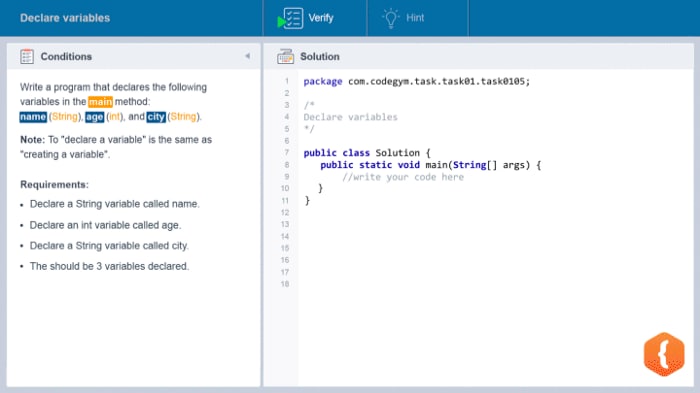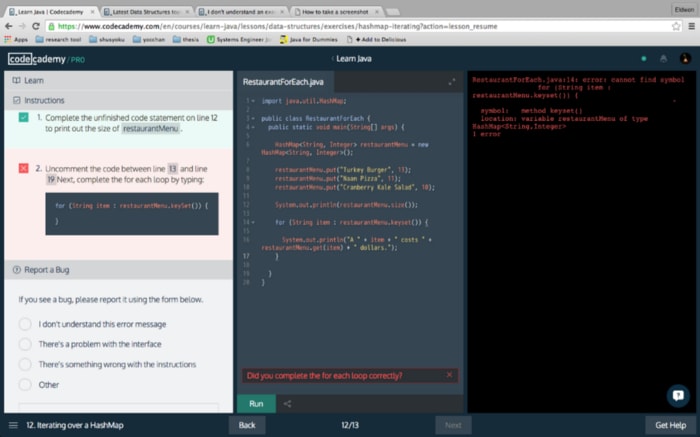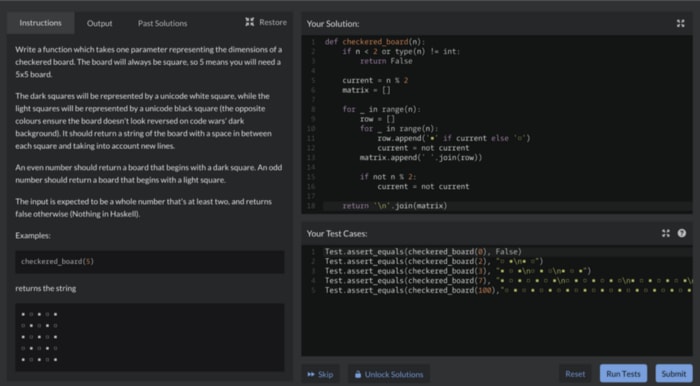We grew up hearing that every individual is different, but surprisingly, I have seen hundreds of students repeating the same mistakes when they start coding. And I have learned that such blunders need to be corrected as soon as possible. Indeed, you have to work hard to learn programming. But hard work without knowing what mistakes to avoid is like trying to beat the wind.
Yes! Trying to learn by evading blunders made by other programmers is a great way to be a successful coder. The real question is: “How do I detect the mistakes before they kill my motivation and overcome them?” Well, I have created a list of some of the most common mistakes people make while they are learning to program, along with their solutions. Let’s unearth them one by one.
Top Mistakes While Learning Programming
Never-Ending Research and Not Enough Coding
Problem
So you’re spending hours researching what programming language to start with. But did you actually start coding? I don’t think so. (But if the answer is yes, you can just skip this point and move to the next one as it’s not for you and you are already on the path to becoming a coding ninja).
So, the first mistake students have been making since they considered whether they could be a programmer is getting stuck with research and not moving to actual coding.
Most students are on the fence when it comes to picking the right programming language, as they believe it’s one of the hardest decisions they are supposed to make. They keep researching the most appropriate web framework, structure, or database. In reality, they are wasting their time on the never-ending research instead of actually learning. That’s how many beginners get stuck in the first phase forever.
The truth is: You can’t even learn a single command from reading and researching. It will never make you a great coder unless you actually begin to code. Any language you select will be a great start to learn the fundamental programming concepts.
Basic skills — such as defining functions, naming variables, or solving some challenging problems — can be found in all kinds of coding. Therefore, there’s no benchmark. So, even if you decide to switch from one language to another, those previous skills will still be useful for you.
Solution
Start with the coding itself instead of just wasting time on the research. The more extensive your coding practice, the more quickly you will learn. It will help you probe the syntax, and you will understand how everything works right from scratch.
When you write any program, you utilize syntax in numerous ways. And as most coding platforms prevent syntax from being written identically, you will face complications and try to solve them on your own. Also, trying to think outside of the box will do wonders to expand your skills. Experiment and implement several other solutions to solve a single problem.
So, when you learn a new concept, start to code immediately. Find coding exercises and then even in case you think that all information is clear and you don’t need practice, believe me, you do need it. I’ll never get tired of repeating that learning to code is always about practice. Write at least three to five programs after conceptualizing the new stuff. This will help you understand syntax comprehensively.
There are several platforms where you can actually get a lot of practice:
- CodeGym — a gamified Java course for those who just joined the programming world.
The course is built in the way you spend 20 percent of your time on theory and 80 — practice. The program is based on only one language — Java, so you can dive deeply into learning this technology. This course is very gradual and I would recommend choosing it as the main learning source.
- Codecademy — one more solution which I like to call “learn to program by programming”.
This course is well-structured and it guides you from the very beginning to more advanced levels. I would say this website might be a nice complementary source in learning Java but you will have to find platforms to learn the fundamentals.
- Codewars — an online competition for developers.
Exactly, as soon as you feel confident with basics, it’s time to participate in contests. I must admit students love it. You can find competitions in different languages. There are different coding options for you: you can write your code in a browser and investigate it step by step, code individually or solve tasks in a group.
Comparing with Others Too Much and Growing Self-Doubts
Problem
When I started programming, I used to get hit by self-doubt most of the time. As a beginner, clueless, and fearful coder, I started pondering my capabilities, as I saw experienced programmers settling slips within a blink of an eye. Many students do the same.
Firstly, you must understand that every experienced programmer was once a beginner as well. All of them struggled with very similar issues as you do now.
Secondly, if you’re learning with your friends or other beginner developers, and at some point, you start thinking that they are smarter than you because they know some topics better than you, remember that usually, it is just a beginner’s illusion. They probably have just spent more time on a specific topic, or maybe it’s easier for them to digest the new information because of the previous knowledge they already have. Finally, everyone has a different pace of studying.
I know that sometimes programming might be a nightmare, and as a beginner, people often look at others and start thinking they are not smart problem solvers or have the wrong type of brain for coding. Likewise, they are stuck with numerous ill thoughts in their heads, which makes them feel shaky about their coding capacity.
Solution
The only solution to this problem is to stop comparing yourself with others, especially with experienced programmers. And whenever you feel the slightest self-doubt in your existence, assure yourself that you are pretty steady to overcome any hurdle that comes between you and your coding dreams.
Remember, programming is all about taking challenges and assisting clients to solve their issues. So before trying to help them, help yourself by clearing out all self-doubt.
Here’s a list of forums where you can meet newbies in programming :
- Stack Overflow
- GitHub
- WebDevelopers (especially good for beginners)
- Hacker News
- SitePoint
- CodeProject
- DZone
Thinking You Know It All
Problem
I know it feels awesome when your initial coding produces bug-free results. Finally, you get that “I am unstoppable” kind of a feeling that heightens your spirit so much you even think to offer training to others.
You start believing you know everything. But, unfortunately, that’s the beginning of the wrong turn. The feeling of knowing everything restricts you from learning more and more, and when you come across any complex project, you get stuck, and the self-doubt cycle is activated once again.
This problem is not only with beginners; I have also seen many proficient programmers have the same dilemma. They had stopped learning and practicing after completing a few chores, so they were losing their value in the IT industry.
Keep in mind that programming is a never-ending process. There are at least a few new frameworks introduced every day, which certainly requires you to consistently learn new structures.
Solution
Classified among the best ways to learn programming is recognizing that coding has no end. The moment you get the feeling of knowing everything, involve yourself immediately in finding a complex project that will keep your feet on the ground.
All successful programmers study all the time because they always want to be realistic and up-to-date on their knowledge to meet the market’s demand. Don’t underestimate or overrate your skills — maintain a humble but confident balance.
Treating Learning to Code Like Studying for a Test
Problem
I often see students try to memorize coding techniques instead of perceiving the notion as information that builds and grows as you learn. Rote memorization can be useful, but it sometimes stops students from seeing the broader view.
Programming is not about being a quiz-topper. It doesn’t matter how good your memorizing ability is — if you fail to grasp the more complex ideas, there’s no way you can qualify as an outstanding programmer in the real world.
Coding is all about offering solutions. You need to understand both the coding language and different approaches to overcoming different challenges. There’s no cheating! All programmers use Google while coding, as the ultimate goal is to find a solution to clear up a certain issue.
Solution
As I have mentioned above, there’s no such thing as “cheating.” So there’s no need to memorize everything by heart because you always have access to different resources.
The best approach is to understand architecture, knowing how to combine things and where to find them.
Therefore, taking help from other resources will get your work done accurately. Look for answers to your questions on GitHub, Stack Overflow, Reddit (r/WebDev, r/Frontend, r/AskProgramming, r/LearnProgramming, r/Coding) etc. It will encourage you to understand coding more simply and establish a problem-solving attitude. So that’s the correct answer to the question of how to learn programming in the right way.
Learning Alone and Being Too Shy to Ask for Help
Problem
No matter how hard you try to live in seclusion, you need a community to survive. The same rule applies to you as a programmer. I know it feels like a blessing to create programs in total isolation, but that’s not the case in the business world. A programmer should be a team player prepared to help clients and his or her fellow teammates.
When it comes to learning, it feels awesome to share new ideas with someone. Talking to other programmers can help you share and receive new knowledge and experience. Plus, it’s a friendly way to help those who know less than you. Similarly, many developers share their life hacks that actually provide benefits to everyone, as they feel united through a common coding language and the same tasks.
Solution
I believe another element of your best way to learn programming is joining coding communities (I gave you a list of communities earlier in this article). You can find other coder groups or attend meet-ups, or you can simply start your own. Contrarily, you can also become an active member of the coding alliance by participating in online platforms. Remember, the main intention is to increase interaction with other coders, as it will enhance your coding knowledge.
Thinking You Need to Be a Math Genius to Be Any Good at Programming
Problem
Being an average math student, my student was always nervous about choosing his passion, as he heard that only math geniuses can excel in the programming field. But I was so happy when he gradually realized that he was wrong, and those who infiltrated his heart were living with a misconception. Coding is not about how extraordinary you are at math but how quickly you can overcome issues.
Solution
Swallow the fact that even an average math person who has failed a calculus exam in college can be a coding wizard. I am not trying to say that programming excludes mathematics, as you do need to know math if you want to work with science programming or create game engines. But in general, you don’t have to be a math genius to turn into a thriving coder.
Besides, if you know basic math from school, you can achieve great things in programming. And even if you have forgotten that, no problem! You will pick up this knowledge while working on a real-time task and doing the actual coding.
Giving Up Right Before a Change Is About to Happen
Problem
Last but not least, students sometimes give up easily. See, learning to program, especially if you want to make it your livelihood, takes a lot of hard work. Sometimes people relinquish without knowing they are only a few miles away from the road to success.
In my entire career I’ve never seen a programmer who hasn’t made any errors while coding as a beginner. It’s a natural phenomenon that fades away with time. But quitting is never a choice.
Solution
When I see my students falling apart and losing their minds, I tell them three magical words: never give up. Indeed, you will feel exhausted and stressed, but that is how you will become a master. Patience is necessary, and diligence is what you need.
Conclusion
To be honest, most students stumble as soon as they begin to learn programming. However, it’s better to know the most widespread faults instead of simply being unaware of them. I have pointed out all the major mistakes here, so dodge them all.
But the main advice is the same as always: keep coding and don’t give up. Try to code as much as possible to achieve your objectives.
First published on GitConnected






















